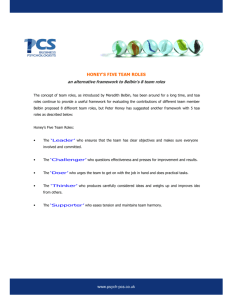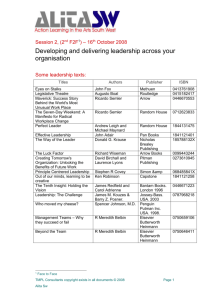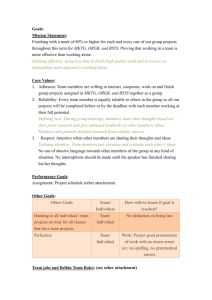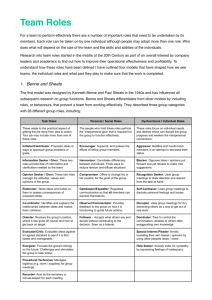How to use Belbin Reports to raise self
advertisement
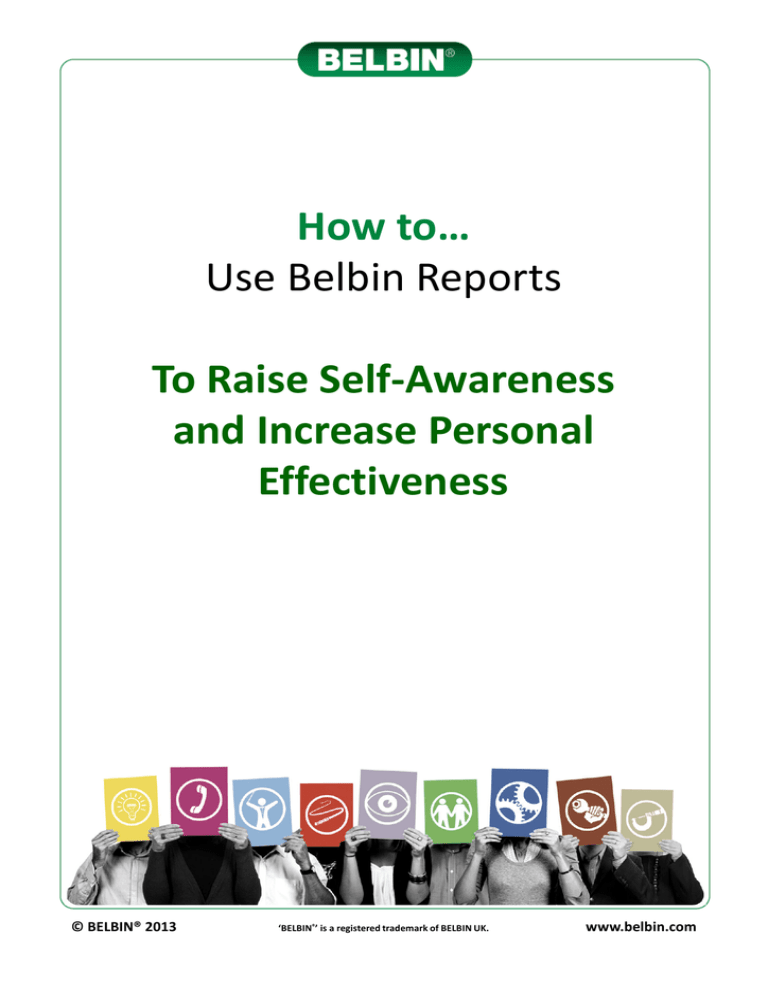
How to… Use Belbin Reports To Raise Self-Awareness and Increase Personal Effectiveness © BELBIN® 2013 ‘BELBIN®’ is a registered trademark of BELBIN UK. www.belbin.com This ‘How to… Use Belbin Reports To Raise Self-Awareness and Increase Personal Effectiveness’ Guide is published by Belbin UK. It may not be reproduced in any form without prior permission from Belbin UK. Additional copies of this report can be obtained by contacting Belbin UK at: info@belbin.com / +44 (0) 1223 264975 © BELBIN® 2013 ‘BELBIN®’ is a registered trademark of BELBIN UK. www.belbin.com How to… Use Belbin Reports to Raise Self-Awareness and Increase Personal Effectiveness Everyone has something to contribute to a team, but some begin the Belbin process with greater self-knowledge and self-understanding than others. Some people have been in work – even in a particular team – for a long time and are well-established and wellknown. Some just have a greater perception than others of how they behave and how their behaviours are perceived and understood. Whatever the situation, this guide demonstrates how Belbin reports can be fed back in order to maximise an individual’s contribution. Belbin isn’t just about team work, it is also about increasing our understanding of ourselves and other people, in order to help us work most effectively. Belbin measures behaviour so that we can identify how best to promote strengths and mitigate potential shortfalls. N.B. Throughout this report we have used a range of Belbin reports from different individuals to illustrate the points being made. Self-portrait: a starting-point Belbin reports are derived from two sources: the individual’s “Self-Perception” and the views of others – called Observer Assessments. Your Team Role Preferences uses only Self-Perception data, splitting the roles into three categories: Preferred Roles (which usually can and should be played as often as possible); Manageable Roles (which may be cultivated if required) and Least Preferred Roles (which should be covered by others in the team, if possible). © BELBIN® 2013 ‘BELBIN®’ is a registered trademark of BELBIN UK. www.belbin.com It is useful to ascertain whether or not the individual agrees with this report. If not, are there particular reasons for it? For example, was the individual in question – whether consciously or not – trying to show themselves in a particular light? If someone feels that the report does not reflect his or her behaviour, these avenues may be worthy of investigation. What we do, not who we are Psychometric tests measure personality (who we are); Belbin measures behaviour (what we do). Observer Assessments are integral to the Belbin process, because they can provide behavioural evidence to corroborate – or contrast with – the individual’s SelfPerception. Without the addition of Observers, the Belbin profile may not truly reflect the individual’s behaviour in relation to other people – it may be distorted by mood, limited self-awareness, aspirations or even a desire to influence the results. Whilst the individual may agree wholeheartedly with the self-reported outcome, this may not help to develop his or her performance in relation to other people. Observer Assessments provide greater accuracy and validity – a behavioural “reality check”. They offer a real learning opportunity, can help to identify discrepancies or conflicts and can provide a useful discussion starter for personal development. Is everyone in agreement? For some, there will be consistency between Self and Observers, whilst for others, the picture may not be so clear cut. Observations may differ greatly from the Self-Perception (a discordant profile) or there may be disagreement between Observers as well (a confused profile). Since the individual’s level of self-awareness may have a bearing on the consistency of the overall behavioural picture, it is important to tread carefully, adapting your approach according to the person in question, so that he or she gains pointers for improvement, without being overwhelmed or put off by the process. The Analysis of your Team Role Composition report page provides a useful overview. © BELBIN® 2013 ‘BELBIN®’ is a registered trademark of BELBIN UK. www.belbin.com If possible, it is best to display Observer names so that the individual can talk about specific working relationships with others and explore why differences might occur. In this example, Observers seem to divide into two groups: those who have observed Chris as a Plant/Shaper and those who see Completer-Finisher/Teamworker behaviours. Perhaps Chris works in two different teams or contexts and adapts his behaviour accordingly? In this example, it is possible that Chris as a manager is a Plant/Shaper, coming up with new ideas and driving others forward to bring them to fruition. Perhaps, when Chris is among other managers, he adopts a more supportive role, playing the diplomat and focusing on details which others might miss. Please note: If you have a full Belbin Online Account, you can also split Observers down into groups and produce two distinct reports, one for each set of Observers. This can help the individual to increase their effectiveness in each setting. A minimum of four Observer Assessments is required to produce a full report incorporating Observer feedback. Where there is disagreement between Observers (a confused profile), it is worth exploring why people may have observed such different behaviours. Is the individual new to the job or in transition to a new functional role? Is there a problem with establishing and promoting a Team Role “identity” or a desire to try and be “all things to all people”? The Comparing Self and Observer Perceptions report page gives an “at a glance” view of the similarities and differences between Self and collated Observer perceptions: You might wish to discuss which Team Roles show the greatest difference between Self and Observers and possible reasons for this. For example, does the individual aspire to play a certain role? Does he or she vary roles according to the demands of different situations? © BELBIN® 2013 ‘BELBIN®’ is a registered trademark of BELBIN UK. www.belbin.com Promoting strengths and managing weaknesses The Maximizing your Potential report page uses specific Team Role information to provide more detailed feedback on an individual’s strengths and possible weaknesses. These are derived from combining Self and Observer views: Strengths You: • maintain a broad focus while leaving the details to others • are likely to be a high-profile, dominant person, capable of making your voice heard. • are able to give confidence and direction to others and to steer people towards common objectives. • are dynamic and entrepreneurial: a developer of new ventures. Possible Weaknesses You may: • take a generalist approach and tend not get involved with specifics. • depend on continuous stimulation and be inclined to lose interest quickly. • have difficulties thinking through the potential implications of a given action or set of circumstances. In light of these points, you might ask: • Do these statements ring true – can you identify with them? • What do they suggest about the strengths you bring to your interactions with other people? Can you give any real-life examples which reflect these strengths? • What sort of problems do they suggest you might encounter when working with others and what impact may this have on others you work with? Can you think of times when you have encountered these sorts of difficulties and strategies you have identified to deal with them? You might also wish to refer to the List of Observer Responses page to identify which characteristics in particular account for the Observers’ views. You could begin by looking at the top ten observer words, exploring why Observers might have ticked these words and what overall picture they paint of the individual’s behaviour. Words shown in italics denote a possible weakness. If these feature prominently in the top ten words, it might be worth exploring how these weaknesses could be managed so as not to hinder the individual’s performance. © BELBIN® 2013 ‘BELBIN®’ is a registered trademark of BELBIN UK. www.belbin.com The Observed Team Role Strengths and Weaknesses bar graph is useful for identifying which roles are worth the individual playing and which are best avoided, according to the Observers: Rather than being overly concerned with measurement and scale, the idea of this graph is to look at the overall shape and balance of roles. With any Team Role, we would expect to see Associated Weaknesses as the flipside of the Team Role strength. However, if the “Associated Weaknesses” bar is large for a given role and the corresponding strengths are not significantly greater, we might conclude that this individual should avoid the role in question, since the overall impact on the way they work is not a positive one. If a behaviour perceived by the individual to be a preferred role does not feature prominently on this graph, it could be that the individual needs to demonstrate this behaviour more obviously to others. © BELBIN® 2013 ‘BELBIN®’ is a registered trademark of BELBIN UK. www.belbin.com Ringing the changes Armed with the full Belbin “picture”, how does the individual make use of this information on a practical level? The Understanding your Contribution section, based only on the individual’s selfperception responses, offers some suggestions: Looking at the results solely from your self-perception, you have highlighted two possible contributions you can make. Below is some advice on how to play to your strengths further in these areas: To play your Shaper role to better effect, cultivate your image as someone who is ready to speak out on important subjects and can handle controversial issues. If you can do this in a positive manner, you could become a valuable spokesperson for the team. To play your Co-ordinator role to better effect, take the lead role in bringing others to agreement on important decisions. Aim for a balance between airing different views and moving to a conclusion. If the profile in question is discordant or confused, the individual may not agree with the Observer views (and consequently may dispute the overall Belbin profile). In this situation, the “Understand your Contribution” section is particularly important. If the individual is to “win round” the Observers, this section gives them pointers on how to promote and announce the strengths they claim to possess. These pointers are Team Role-focused, but also pertain to the way an individual answered the Self-Perception Inventory. In other words, the same tips may not arise for another Shaper-Co-ordinator, but are specific to an individual’s responses and designed to help improve individual performance. Getting it right Individuals are likely to be most comfortable when their preferred roles are known and announced, and when others with whom they work see and appreciate these contributions too – in other words, when there is agreement between Self and Observers. This may take some time to accomplish but, in the long run, it can enable an individual to work more effectively and to derive a greater sense of achievement from their work. © BELBIN® 2013 ‘BELBIN®’ is a registered trademark of BELBIN UK. www.belbin.com Notes: © BELBIN® 2013 ‘BELBIN®’ is a registered trademark of BELBIN UK. www.belbin.com Further Information This ‘How to…’ guide is one in a series to help you use the Belbin reports to maximise the performance of individuals and teams. Additional copies of this guide are available. Belbin Reports Individual reports (including Observer Assessments at no additional cost) can be purchased online via www.belbin.com for just £35 each. If you are looking at using more than 50 over 12 months, please contact us for a quote. The Team/Group reports discussed in this guide can be produced once the individuals have completed their Self-Perception Inventory and received all the Observer Assessments (if required). • If you have a full Belbin Online Account you can produce Team/Group reports free of charge. • If you use a ‘Pay as you Go’ Belbin Online Account, the Team/Group report cost £75 + VAT. Accreditation The Belbin model has numerous other applications. To ensure that you are using the Belbin Team Role reports to their maximum potential, and making the most of your investment, we would recommend attending the Belbin Accreditation Course. Details and prices can be found at www.belbin.com. Further Reading The Belbin Guide to Succeeding at Work – provides an ideal introduction to Belbin Team Roles, helping you to understand yourself, and how to project your behaviour to your advantage. (BELBIN, The Belbin Guide to Succeeding at Work, Belbin, 2008-12. ISBN: 9780-955-2979-5-3) Team Roles at Work – offers managers a practical guide to improving their teams within the workplace to deliver significantly better results for their organisations. This reflects well on them as a manager whilst also saving them time and energy, by using each team member to their best advantage to achieve overall team goals. (R Meredith Belbin, Team Roles at Work, Taylor & Francis, 2nd ed., 2010. ISBN: 978-1-85617-8006) For more information regarding Belbin Team Roles, please visit www.belbin.com or phone +44 (0) 1223 264975. © BELBIN® 2013 ‘BELBIN®’ is a registered trademark of BELBIN UK. www.belbin.com Team Role Summary Descriptions © BELBIN® 2013 ‘BELBIN®’ is a registered trademark of BELBIN UK. www.belbin.com BELBIN 3-4 Bennell Court, West Street Comberton, Cambridge CB23 7EN, UK T +44 (0) 1223 264975 F +44 (0) 1223 264976 E info@belbin.com www.belbin.com © BELBIN® 2013 ‘BELBIN®’ is a registered trademark of BELBIN UK. www.belbin.com
